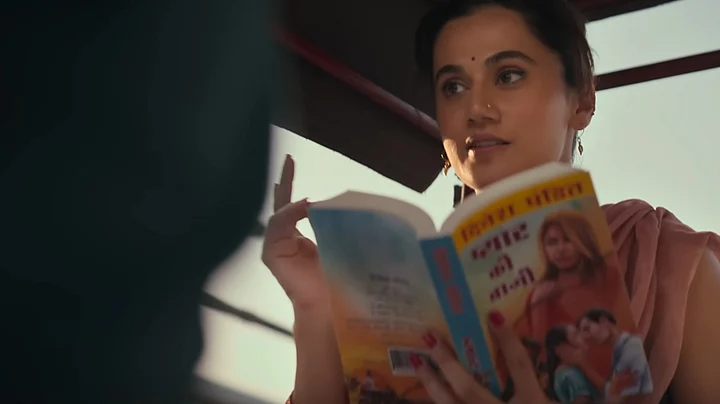There is no hiding the popularity of vernacular crime or detective fiction in India – a simple glance at the book stalls at railway stations would give one a glimpse into this multilingual world.
While people have often looked at this genre with disdain, many have wholeheartedly embraced its pulpy world. Over the past few years, even the Indian audience has rediscovered their love for this ‘pulp’ and Haseen Dillruba rests comfortably in that world.
So it's no surprise that the film got a sequel – the film this review is about – Phir Aayi Hasseen Dillruba. We meet the destructive ‘love’birds Rani (Taapsee Pannu) and Rishu (Vikrant Massey) soon after the events of the first film. A man dead, the cops (perhaps) fooled, a couple on the run.
The first film had rightfully garnered criticism about its superficial look at its own subject which resulted in a glorification of a toxic relationship (and domestic violence) and, at the same time, was appreciated for how engaging it was.
The second film, thankfully, doesn't have part of that first problem – the biggest issue still is that it isn't ready to quite dissect its protagonists for how problematic their relationship is. It also, to its benefit, remains delightfully pulpy and engaging. The credit, this time around, rests primarily with the cast.
Rani is easily one of Pannu’s most interesting characters, elevated by her synergy with writer Kanika Dhillon. While there is no denying Pannu’s ability as an actor as Rani, credit also goes to how well Dhillon understands which parts of Pannu’s skills to highlight to make Rani a better character. Whether it's her running down the street in distress drenched in rain or her yelling on someone on the phone – Rani remains quite an interesting femme fatale.
That energy is willfully and beautifully matched by Massey’s restraint – playing a character now unmasked and amoral.
In Phir Aayi Hasseen Dillruba, Rani now lives in Agra as a widow secretly meeting her Schrödinger's husband (Is he dead? Is he alive?) However, this ‘haseen dillruba’ has a new admirer – the meek and helpful ‘aashiq’ Abhimanyu (Sunny Kaushal). To be fair, love has never been at the heart of the ‘Haseen Dillruba’ universe – there has always been something more sinister at play.
Would two criminals on the run only run into more trouble? And will they finally meet their match – whether in the good or the bad? Those are the threads the sequel pulls at. Kaushal’s ability to seem both harmless and instantly creepy in the next second adds to the intensity.
Speaking of intensity, however, brings us to the screenplay. A story like Phir Aayi Hasseen Dillruba requires the audience to completely surrender to the pulpy universe – to overlook some of the loopholes – but that requires a solid screenplay and execution. Director Jayprad Desai doesn't have the same finesse or grip on the story that Vinil Mathew (dir. ‘Haseen Dillruba') did and the screenplay comes off feeling a little episodic.
The twists and turns become more predictable which takes away from the film. The thing that keeps you engaged is actually a character we never see – Dinesh Pandit. While the world of crime and passion plays out in front of your eyes, you can't help but wonder what Pandit ji would've written for the story if he was behind the camera. Where would this mysterious author take this mystery? It's a fun layer to the film that still keeps you on your toes before the ending unravels.
The film's other highlight is its music – the songs and the background score. And while the camerawork in the sequel feels more artificial than its predecessor it isn't a big turn off.
Phir Aayi Hasseen Dillruba crumbles under its own weight leaving the incredible cast to sift through the pieces and find the bits that would keep the audience coming back for more.
And yet, the one thing that I kept looking for through the film was ‘focus’. See how I've barely spoken about the cops after mentioning them once? That's because I'm compelled to do so by the film itself – the film forgets to honour its procedural angle. And that's a pity especially because of the fantastic actors we have on that side – Aditya Srivastava’s character and Jimmy Shergill’s Montu are both hot on the couple’s heels.
Montu is compared to a woodpecker – he pecks and prods till he's at the heart of the matter so it really is a pity that we don't actually get to see that intensity from the character.
This focus issue does make sense in a way – a pulpy crime fiction novel has the liberty to slowly unfold with every turn of the page. The author does enough to make readers return to the novel over and over again, ironing out one dog ear after another.
That engagement is very difficult to recreate in a feature film but it's not the audience’s fall for wishing for it.
